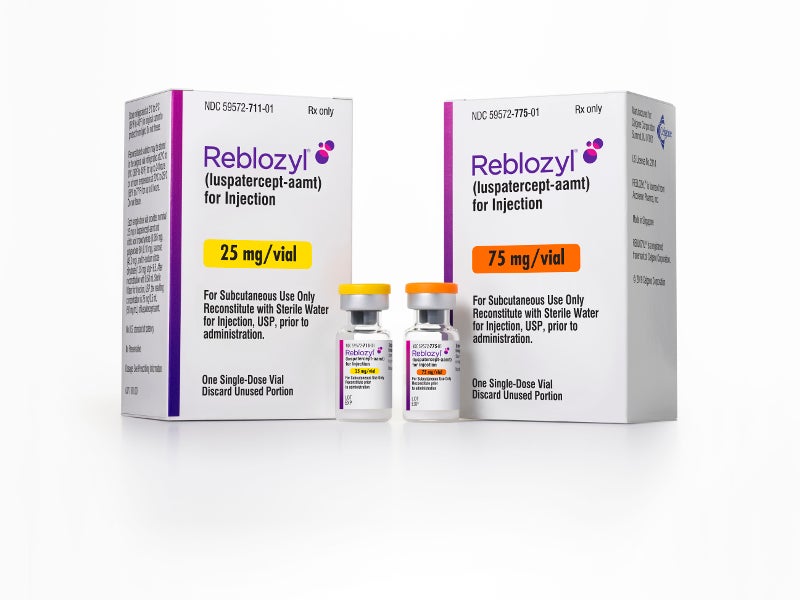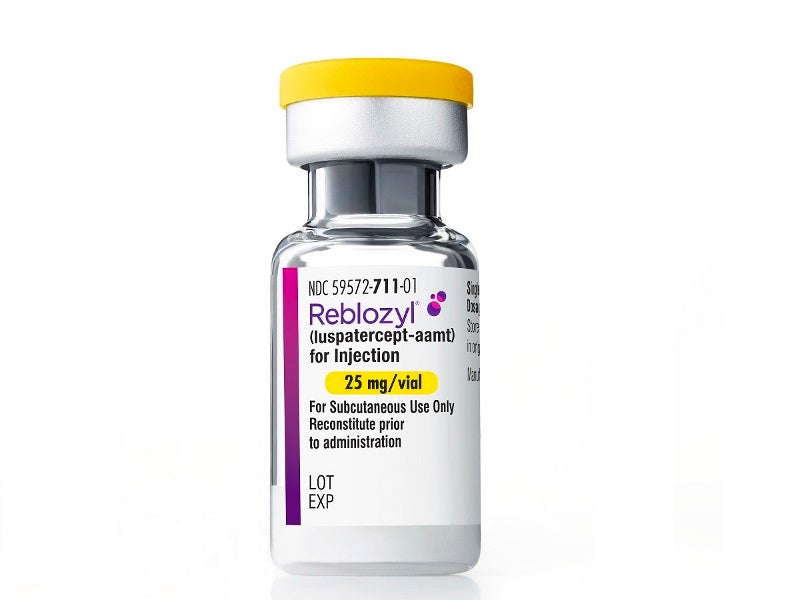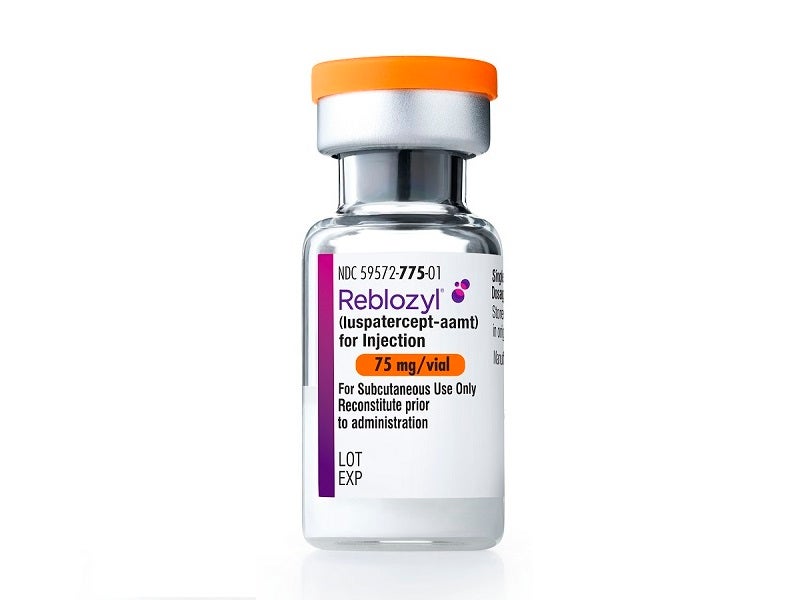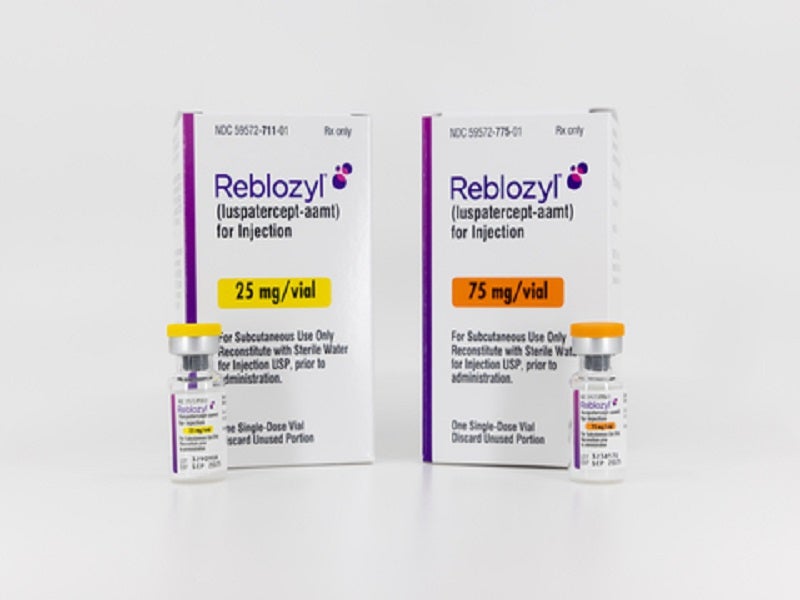REBLOZYL (luspatercept-aamt) is a novel erythroid maturation agent (EMA) approved to treat anaemia associated with beta-thalassemia in adult patients who require regular red blood cell (RBC) transfusions.
The drug is also eligible to treat anaemia without previous erythropoiesis-stimulating agent use (ESA-naive) in adult patients with very low to intermediate-risk myelodysplastic syndromes (MDS) who may require regular RBC transfusions and to treat anaemia failing an ESA and requiring two or more RBC units over eight weeks in adult patients with very low- to intermediate-risk MDS with ring sideroblasts or with myelodysplastic/myeloproliferative neoplasm with ring sideroblasts and thrombocytosis.
REBLOZYL is the first and only therapy to demonstrate superiority compared to an ESA in MDS-associated anaemia.
REBLOZYL is available as an off-white lyophilised powder in a single-dose vial in two different strengths 25mg and 75mg, for subcutaneous injection.
Regulatory approvals for REBLOZYL
The biologics license application for the drug was accepted and a priority review was granted by the US Food and Drug Administration (FDA) in June 2019. REBLOZYL was approved by the FDA in November 2019.
In January 2023, the Committee for Medicinal Products for Human Use (CHMP) of the European Medicines Agency recommended approval of REBLOZYL as a treatment for adult patients with anaemia associated with non‑transfusion-dependent beta-thalassemia.
The drug received approval for the condition in Europe in March 2023, based on results from the Phase II BEYOND study. Further, the CHMP also recommended the drug to treat adult patients with transfusion-dependent anaemia due to very low, low, and intermediate risk in February 2024.
In August 2023, Bristol Myers Squibb received the FDA approval for REBLOZYL as the first line treatment of anaemia in adults without previous ESA use with very low to intermediate-risk MDS who may require regular RBC transfusions.
REBLOZYL is approved in the EU, the US, China, and Canada to address anaemia-associated, transfusion-dependent beta-thalassemia, and transfusion-dependent lower-risk MDS.
Beta thalassemia causes and symptoms
Beta thalassemia is a congenital blood disorder that inhibits the production of haemoglobin. Also known as Cooley’s anaemia, the disorder occurs due to genetic defects that cause abnormalities in haemoglobin structure.
Beta thalassemia is linked to ineffective erythropoiesis, resulting in the production of fewer and unhealthy RBCs, often leading to severe anaemia.
The disease is categorised into two types, thalassemia major and intermedia. Thalassemia major is the more serious of the two.
The signs and symptoms of thalassemia intermedia appear in early childhood, within the first two years of life.
Typical symptoms include skin yellowing, eye whitening, enlarged spleen, liver, and heart, misshapen bones, delayed puberty, frequent blood transfusions, liver, heart, and hormone problems.
MDS causes and symptoms
MDS are a group of haematologic malignancies in which mutations prevent the bone marrow from producing healthy RBC, white blood cells and platelets, which can lead to anaemia and frequent or severe infections.
People with frequent transfusions are at higher risk of iron overload, transfusion reactions, and infections. People who are highly dependent on RBC transfusions have a significantly shorter overall survival, partially due to iron overload or more severe bone marrow disease compared to non-transfusion-dependent patients.
In most cases, MDS has no known cause, while in others, it is caused by exposure to cancer treatments, such as chemotherapy and radiation, or to toxic chemicals such as Benzene.
Symptoms include fatigue, shortness of breath, unusual paleness, unusual bruising or bleeding, and pinpoint-sized red spots just beneath the skin that are caused by bleeding, and frequent infections.
REBLOZYL’s mechanism of action
Luspatercept-aamt is a recombinant fusion protein that binds multiple endogenous transforming growth factor-beta superfamily ligands, reducing Smad2/3 signalling and increasing the count of mature RBCs.
The drug is a first-in-class EMA that promotes late-stage erythroid maturation or differentiation of RBCs.
REBLOZYL enhances erythropoiesis by boosting the quantity and enhancing the quality of mature RBCs.
Clinical trials on REBLOZYL
The US FDA approval of REBLOZYL was based on the results of a Phase III randomised, placebo-controlled clinical trial named BELIEVE, which compared the safety and efficacy of REBLOZYL plus best supportive care (BSC) against placebo, plus BSC in adults.
A total of 336 beta-thalassemia patients who required RBC transfusions were enrolled, of which 112 received a placebo. The patients, who were randomised in a 2:1 ratio, received either REBLOZYL or placebo at a starting dose of 1mg/kg via subcutaneous injection every 21 days up to 48 weeks.
The study was conducted at 65 different locations across 15 countries. Its primary endpoint was a comparison of baseline reduction in RBC transfusion burden in the REBLOZYL arm to the placebo arm.
In the REBLOZYL arm, 21.4% of the patients achieved more than a 33% reduction in RBC transfusion burden compared to 4.5% in the placebo group.
The secondary endpoint of reduction in transfusion burden of at least 33% was achieved in 19.6% of patients in the REBLOZYL group, compared to 3.6% in the placebo group.
The adverse events reported during the trial were thromboembolic events such as deep vein thromboses, pulmonary embolus, portal vein thrombosis, ischemic stroke, hypertension, and cerebrovascular accident.
COMMANDS clinical trials
The FDA’s approval of REBLOZYL for the treatment of anaemia due to very low, low or intermediate-risk MDS in ESA-naive patients who are RBC transfusion-dependent was based on results from interim pivotal Phase III COMMANDS trial.
The trial determined the safety and efficacy of the drug versus epoetin alfa for the treatment of the patients. The open-label, multicentre, randomised study was conducted at 142 sites in 26 countries.
The study results indicated that 58.5% of patients who were administered REBLOZYL achieved the primary endpoint of maintaining RBC Transfusion Independence (RBC-TI) for at least 12 weeks, accompanied by a mean increase in haemoglobin levels of at least 1.5g/dL within the initial 24 weeks, compared to 31.2% of patients treated with epoetin alfa.
Patients treated with REBLOZYL demonstrated durable responses with approximately 2.5 years of median RBC-TI greater than or equal to 12 weeks with a well-established safety profile.
The most common adverse effects reported by the patients during the clinical trials were diarrhoea, fatigue, hypertension, peripheral oedema, nausea, and dyspnoea.






